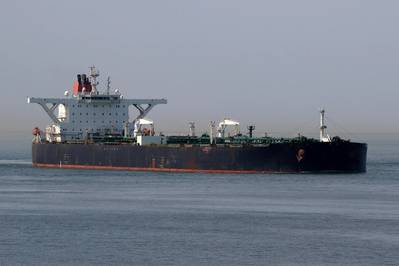Venezuela Oil Sector Hit by Loss of Its Widest US License
Venezuela's loss of a key U.S. license that allowed it to freely export and increase investment in its oil sector will hit the volume and quality of its crude and fuel sales while prompting a flurry of requests for individual U.S deal authorizations.
U.S. officials had warned that absent progress by President Nicolas Maduro on implementing an electoral roadmap agreed last year, the U.S. would not renew license 44, which since October had eased oil sanctions in place for the last five years.
On Wednesday, the Treasury gave companies 45 days to wind down pending transactions under a more restrictive license.
The period could allow departures by some oil supertankers chartered by customers of state company Petroleos de Venezuela,or PDVSA, that had waited for months to load in Venezuela, but others might need individual U.S. authorizations to complete their purchases.
Venezuela's Foreign Minister Yvan Gil told reporters on Thursday the sanctions had little effect and would not harm Venezuela, but would damage attempts to normalize bilateral relations and hit U.S. interests in the Venezuelan oil industry.
Venezuela's recent prosperity was due not to license 44, but to Maduro's astute economic management, Gil added.
The economy is suffering a long-running crisis, though the government has made strides on inflation control in the last year, bringing usually triple-digit 12-month figures down to about 68% in March.
Washington said on Wednesday it would process specific authorization requests for doing business with Venezuela, a commitment Venezuelan officials said they expect the U.S. to honor. Many companies have waited for years to have energy deals involving Venezuela approved.
Authorizations previously granted to oil firms including Chevron, Repsol and Eni were not withdrawn, which secures Venezuela's oil flows to the United States and Europe.
But the U.S. Treasury Department said entering into new business arrangements or investments previously authorized "will not be considered wind-down activity," casting doubts on what type of transactions will be allowed.
The prior, six-month license did not provide enough time for Venezuela to secure long-term investment in its energy industry. But companies already in the country were negotiating area expansions and projects linked to existing joint ventures with PDVSA.
Venezuela expects some of those expansions to be authorized in the 45-day window, including with Chevron and Repsol, and it will resort to individual license requests after that, Oil Minister Pedro Tellechea said on Wednesday.
Political moves
The withdrawal of the most significant element of U.S. sanctions relief marks a major step back from President Joe Biden's policy of re-engagement with Maduro.
However, it stops short of a return to the "maximum pressure" campaign waged under former President Donald Trump and could change depending on progress towards the presidential election.
Venezuela's opposition is negotiating the selection of a candidate for the July 28 election, after both the winner of its primary and her alternate were prevented from registering.
The license had allowed PDVSA to expand exports to pre-pandemic levels, improve cash flow and secure imports of diluents and fuel for the domestic market.
Its expiration leaves exports expected to stagnate this year at around 900,000 barrels per day (bpd) while oil output would reach a ceiling of about 1 million bpd in 2025, analysts said.
But under a separate U.S. authorization still in effect, about one-fifth of Venezuela's oil exports sent by Chevron to the U.S. should continue flowing and rise to 200,000 bpd by year end. About 80,000 bpd in crude shipments to Europe also are not expected to decline.
In March, PDVSA's oil exports climbed to the highest level in four years as customers rushed to complete purchases ahead of the license expiration. But the backlog of tankers waiting to load at Venezuelan ports has not eased significantly, shipping data showed.
The six weeks granted by the U.S. to complete transactions might not be enough to resolve the bottleneck entirely, traders said.
Under the previous license and separate authorizations, Venezuela's crude production expanded to 874,000 bpd in March, and it added two operational drilling rigs.
Without the authorization, PDVSA is expected to resort again to little-known intermediaries to sell its oil under price discounts, mainly to Asia, unless enough U.S. individual authorizations are issued, experts said.
PDVSA's finances, eroded by five years of sanctions, will also take a new hit, limiting access to hard currency needed for affording everything from labor to procurement.
(Reuters - Reporting by Marianna Parraga, Matt Spetalnick, Daphne Psaledakis, Deisy Buitrago and Marion Giraldo; Editing by Richard Chang)













